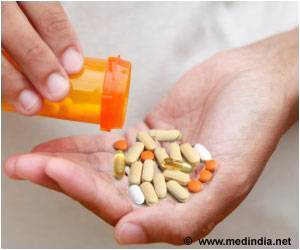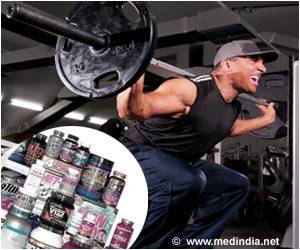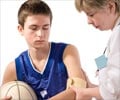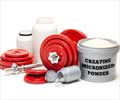- Dietary Supplements and Sports Performance: Introduction and Vitamins - (https://www.ncbi.nlm.nih.gov/pmc/articles/pmc2129136/)
About
Sports supplements are all the rage and most people seem to be taking them whether or not it is necessary for them. First, it is important to understand what a supplement is. By definition a supplement is "a thing added to something else in order to complete or enhance it." A dietary supplement is one which is intended to provide nutrients which may not be available in sufficient quantities from food.
How much of nutritional supplement does an individual involved in sports either professionally or recreationally need? That depends on the type and duration of workout the person is engaged in, aside from blood chemistry, history of disease, allergies and many other factors. One must bear in mind that the nutrient requirements during intense exercise are high and may not be supplied through diet alone. Supplement strategies may vary for different sports and it is advisable to consult with a sports nutritionist or sports medicine doctor before taking supplements.
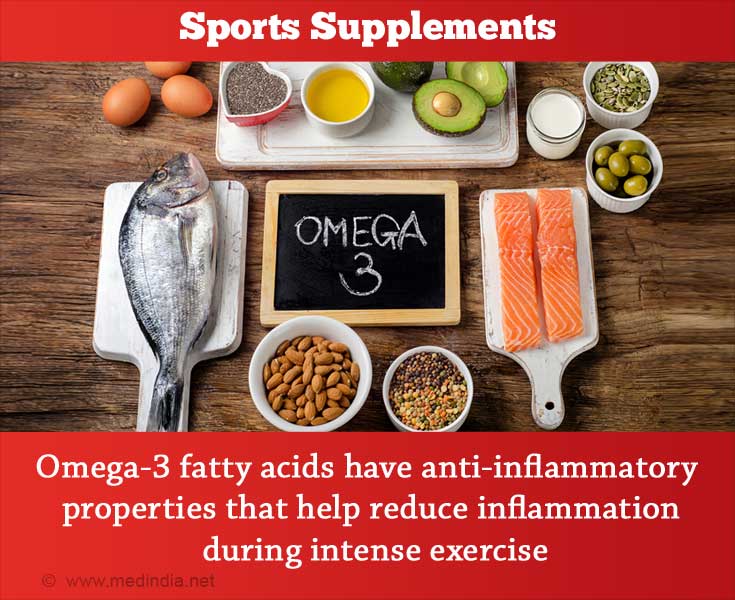
Classification of Sports Supplements
Sports supplements can be classified as sports foods, dietary supplements and ergogenic aids depending on their function.
Sports Foods
A sports food is a convenient and practical substitute to everyday foods. These prove to be beneficial in meeting the nutritional needs of an athlete during intense exercise when the nutrient requirements are more than food can provide in a given time frame. Sports bars, gels, drinks and liquid meal replacements are considered to be sports foods.
Sports foods are mostly those which provide large amounts of carbohydrate for energy. Although fats provide more energy and constitute a larger reservoir of energy stored in the body, carbohydrates are a good source of readily available energy. Carbohydrate is the most important source of energy for the body. It is stored in the form of glycogen in the liver (90-110 grams), muscles (400 grams) and a small amount is present in the blood stream (25 grams). The muscle and liver stores of glycogen serve as a reservoir when glycogen in the blood stream is depleted. Glycogen can be depleted in high intensity and long duration physical activity and carbohydrate must be obtained for food or supplement sources. Most athletes, especially endurance athletes consume sports drinks. Sports bars are generally consumed pre-workout and sports drinks and gels during workout.
Carbohydrate supplements are legal and research has shown that carbohydrate loading before exercise improves performance. Consuming carbohydrates during exercise enhances the endurance capacity of an athlete. Carbohydrates have been found safe for use unless an athlete has poor insulin sensitivity. The carbohydrate sports food should be chosen carefully as excess intake of fructose my result in gastrointestinal discomfort.
Dietary Supplements
Dietary supplements make up for nutrient deficiencies that an athlete may have. Often the utilization of vitamins and minerals during exercise is large and stores cannot be replenished by food only. In such a scenario a deficiency occurs and it is necessary to take a dietary supplement. A sports nutritionist or physician must be consulted before taking a dietary supplement and the deficiency must be confirmed by a blood test result and not just on a whim. Excess intake of vitamins and minerals can be detrimental to overall health.
Omega-3 Fatty Acids-
Omega-3 fatty acids are essential fatty acids, which means that they are not produced in the body and must be obtained from the diet in the form of EPA (eicosapentaenoic acid) and DHA (docosahexoenoic acid) or as the precursor ALA (alpha lenolenic acid) which can be converted to EPA and then to DHA in the body.Research has shown that Omega 3 fatty acids have anti-inflammatory properties. During intense exercise there is inflammation seen in cells due to stress and omega-3 fatty acids will help in reducing this. Aside from this EPA and DHA have been found to have a positive effect on improving the cholesterol levels and promoting good heart health. These are beneficial properties for a sportsperson. Omega-3 fatty acids are found largely in sea food, but for vegetarians there is the option of flaxseed. Capsules containing extracts of omega-3 fatty acids from either fish oil or flaxseed oil are recommended.
| Dietary Supplement | Function | Research Results | Side Effects |
| Thiamin, Riboflavin, Niacin, Pantothenic Acid | Energy metabolism in muscle cell | No effect in healthy individuals. | Excess niacin can impair aerobic endurance performance. |
| Pyridoxine | Synthesis of hemoglobin and other oxygen transfer proteins. This improves endurance. | Improves fine motor control. | Mild if high doses are taken. |
| Folic acid and Vitamin B12 (Cobalamine) | Formation of red blood cells. This increases the oxygen carrying capacity of the blood and thus endurance. | Vitamin B12 has been found to improve fine motor control. | Vitamin B12 – NoneFolic Acid – Mild in high doses |
| Vitamin C | Maintains immune system health. Acts as an antioxidant. | No effect on healthy individuals. | Mild if high doses are taken. |
| Vitamin E | Acts as an antioxidant. Enhances oxygen utilization. Improves endurance at high altitudes. | No significant effect on training, performance or rate of recovery in elite or recreational athletes. | Mild |
| Vitamin D | Involved in muscle cell energetics by increasing calcium absorption. | Not significant | Severe if taken in high doses. |
| Coenzyme Q10 | Antioxidant properties and improved oxygen usage leading to better endurance. | No influence on lipid peroxidation, heart rate, maximal oxygen uptake or endurance performance in healthy individuals. | May cause muscle tissue damage if taken in excess. |
(Adapted from: Ahrendt DM. Ergogenic aids: Counseling the athlete. American Family Physician.2001; 63:913-22.)
Research has shown that if there is a deficiency on any of these micronutrients, performance is impaired. Once the deficiency is corrected there is an improvement in performance. However, studies have shown that athletes on a well-balanced diet do not benefit from taking dietary supplements.
Ergogenic Aids
An ergogenic aid is a supplement that contains larger quantities of a certain nutrient than found in regular food. Some examples are creatine, caffeine and whey protein. Ergogenic aids are involved in certain metabolic pathways and have a direct influence on exercise performance enhancement. Like dietary supplements, ergogenic aids must be taken under the supervision of a sports nutritionist or physician. Many supplements claim to increase muscle mass and enhance performance and because they are listed as supplements they do not undergo screening by the FDA. This is dangerous to the consumer’s health as many supplements in the market have side effects and are illegal. Some of the common ergogenic aids will be discussed below.
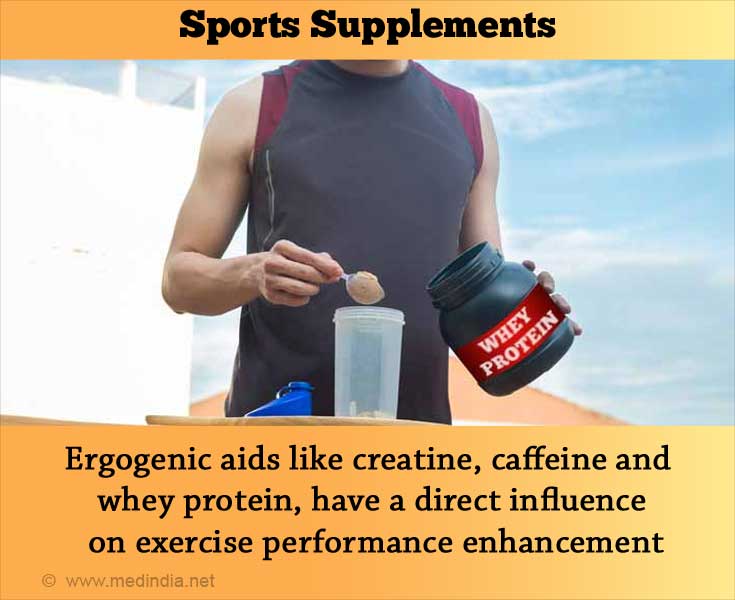
Protein
Proteins are the building blocks of muscle. Amino acid supplements are also found in the market and fall under the category of proteins as amino acids are protein constituents. Protein supplements like whey, casein and glutamine are taken by an athlete to improve muscle recovery and growth. An athlete will be faced with negative nitrogen balance if there is inadequate protein intake. In a state of negative nitrogen balance there is slowed muscle growth and fatigue.
Athletes who are training have increased protein requirements. Research has shown that athletes who consume the recommended daily allowance of protein (0.8 to 1 g/kg body weight/ day) were faced with symptoms of negative nitrogen balance. It is now recommended that athletes consume between 1.4 and 1.8 g/kg body weight/ day protein post workout. Taking protein in excess of these recommendations has been found to have no positive outcome. Athletes with renal conditions must be cautious while taking protein supplements as excess can be detrimental.
Protein supplements are legal and are a good alternative to naturally occurring proteins from food as most protein rich foods are also rich in fat which is not desirable.
Creatine
Derived from animal sources, creatine is a food constituent which is found in muscle tissues. It is used in the form of creatine phosphate for the production of energy during short bouts of intense exercise. Oral creatine supplements provide the body with creatine phosphate which helps enhance performance. Research has shown that creatine has been more beneficial for production of energy during repeated bouts of short duration, high intensity exercise than long duration, low intensity exercise.
Studies have found that creatine supplementation increased strength and mass in both male and female athletes. Athletes aged 60 to 82 years did not have similar benefits from creatine supplementation.
It is legal to use creatine for amateur and professional sports. Choosing creatine monohydrate will be wise as it does not cause dehydration and is safer. Typically creatine supplementation is done using a loading dosage of 20g/ day, which is divided into four doses for five to seven days. This is followed by a maintenance dosage of 5g/ day.
Anabolic Steroids
Anabolic steroids are derived from testosterone and have three mechanisms of action which would benefit an athlete. First, ingested protein is metabolized by the anabolic (breakdown or conversion) effect. This converts a negative nitrogen balance to a positive one. Second, synthesis of skeletal muscle is directly induced by the anabolic effect. Third, it induces a state of euphoria and reduced fatigue which allows the athlete train for longer hours.
Research has shown that anabolic steroids do have a positive effect on muscle mass and strength. However, consuming anabolic steroids has been found to have adverse reversible and irreversible effects. Some of the reversible side effects are nausea, increased urination, personality disorders, aggression, acne, scrotal pain, increase or decrease in libido, decreased sperm production. Liver tumors, psychosis, hypertension, deepening of voice in women and stunted growth in adolescents are some of the irreversible side effects.
Being a testosterone derivative anabolic steroids are used for medical reasons, but purchasing them without a prescription is illegal. Sporting authorities, however, ban the use of anabolic steroids for any reason.
Caffeine
Caffeine helps increase the contractility of the skeletal and cardiac muscles. It also helps metabolize fats which leads to muscle glycogen stores being spared. Being a central nervous system stimulant, caffeine aids in activities which require concentration.
Research has shown association between caffeine and improved endurance timings in athletes. Dosages can range from 3 to 9 mg/ kg. As caffeine is part of a normal diet for most people, it is legal to a certain level. The accepted ergogenic dosage of caffeine is 250 to 500mg which is about three cups of coffee or six to eight sodas. Caffeine levels are tested in the urine of athletes and the accepted limit is 12 ìg/ mL by the International Olympic Committee standard.
Caffeine is usually taken by athletes in the form of a pill. Care must be taken while choosing the dosage as some of the side effects of excess caffeine are restlessness, nervousness, insomnia, tremors and diuresis (excess urination).
Caffeine and Ephedrine Combination
This combination is often used as a stimulant and is found in many supplements to decrease appetite and increase metabolism without exercise. When taking ephedrine in combination with caffeine, studies have shown increased time to exhaustion and lowered perception of fatigue. The same results were not seen with ephedrine alone.
Caffeine consumption is allowed to a certain limit but ephedrine is a banned substance. The adverse effects of this ergogenic combination include restlessness, nervousness, tachycardia (increased heart rate) and hypertension. There have been recorded deaths as a result of using these products in combination.
The number of sports supplements available in the market is overwhelming. Research related to the use of supplements by sportspeople has been contradictory. Working in conjunction with a sports nutritionist or physician is the safest way to choose the right supplement. Good eating habits along with factors such as talent, training, conditioning, motivation, commitment and recovery make for excellent athletic performance and cannot be replaced by a supplement.




